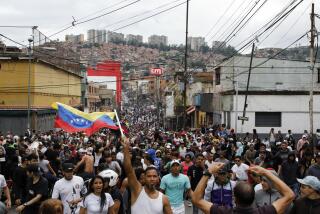Rightist Gets Landslide Win in El Salvador
- Share via
SAN SALVADOR — Right-wing politician Armando Calderon Sol won a landslide victory Sunday over a leftist coalition of former guerrillas to take the presidency and conclude El Salvador’s first postwar elections.
In voting meant as a test of the country’s troubled efforts to rebuild after 12 years of civil war, Calderon Sol of the ruling Nationalist Republican Alliance, or Arena, was defeating leftist legislator Ruben Zamora by a 2-1 margin. The election was a runoff required when Calderon Sol fell just shy of an absolute majority in voting on March 20.
Arena militants burst into celebration late Sunday, driving their cars through the streets of the capital, waving red, white and blue banners and singing their anthem, which pledges to make El Salvador “the tomb where the reds will end up.”
The elections pitted bitter enemies from the civil war against each other and exposed the lingering hatreds that continue to polarize this country two years after U.N.-brokered accords brought a fragile peace.
“Our great challenge now is to consolidate the peace and to ensure the stability and governability of the country,” Calderon Sol said in claiming victory at a nighttime news conference held in San Salvador’s El Presidente Hotel.
Minutes earlier, Zamora, flanked by the former commanders of the guerrilla front, conceded defeat.
“We have widely confirmed that we are the alternative force indispensable to making this country truly governable,” Zamora said.
With more than 80% of the vote counted, Calderon Sol had 68%, with Zamora trailing at 32%, the official Supreme Electoral Tribunal announced.
Throughout the 1980s, the rebels of the Farabundo Marti National Liberation Front, or FMLN, fought a series of U.S.-backed governments until exhaustion and the end of the Cold War forced the two sides to agree to peace and an array of judicial and political reforms, many of which are still incomplete.
The elections marked the FMLN’s first foray into civilian politics, after years of ridiculing and boycotting voting.
“With this election, a new chapter is being opened in the history of El Salvador, a history marked by injustice, marginalization and much blood, a history that must be changed,” Msgr. Gregorio Rosa Chavez, auxiliary archbishop of San Salvador, said in his weekly homily.
The March election was plagued by allegations of fraud and serious irregularities that prevented more than 100,000 people from voting, according to a newly revised estimate by U.N. election monitors.
Officials made the runoff somewhat easier by establishing a larger number of voting stations. Still, basic flaws--such as names omitted from registries--remained and have led to calls for a complete overhaul of an electoral system that seems weighted against the uneducated and in favor of the status quo.
The FMLN complained that the irregularities cheated it out of several municipal and legislative posts; Arena won control of the National Assembly and most of the country’s mayoral offices. The lingering anger raises questions about future stability because some on the left say that if Calderon Sol does not work with them, they will respond with strikes and unrest.
“We will have a constant and permanent dialogue with all sectors and with the FMLN, now more than ever since they . . . have won political space,” Calderon Sol said after his victory.
Earlier, tension between the two sides was evident moments before Calderon Sol cast his vote. As Arena militants chanted their traditional slogan, “Fatherland, yes! Communism, no!” FMLN supporters responded by shouting the name of Roman Catholic Archbishop Oscar Romero, whose 1980 assassination was ordered by the late founder of Arena, Roberto D’Aubuisson, according to a U.N. report on war crimes.
Calderon Sol is said to represent a more hard-line faction of Arena than the man he will replace, President Alfredo Cristiani, who is barred from running for reelection. Arena sources said Calderon Sol will probably turn away from the technocrats Cristiani favored and instead choose a number of party militants to join the government.
“He will have a lot of political debts to pay off,” a European diplomat said.
Calderon Sol has pledged to continue Cristiani’s free-market economic policies, placing emphasis on the lucrative privatization of public utilities, while paying closer attention to long-neglected social areas such as health and education.
Arena’s multimillion-dollar campaign was sophisticated and offered stability. Calderon Sol and his associates, ignoring their own violent history, portrayed the left as Communist terrorists who were exclusively responsible for the war’s death and destruction and who are incapable of governing.
Zamora and the left also have to share the blame for their electoral defeat. Divided and disorganized, they overestimated their support in some areas and failed to calculate the level of resentment against them in other areas.
More to Read
Sign up for Essential California
The most important California stories and recommendations in your inbox every morning.
You may occasionally receive promotional content from the Los Angeles Times.














